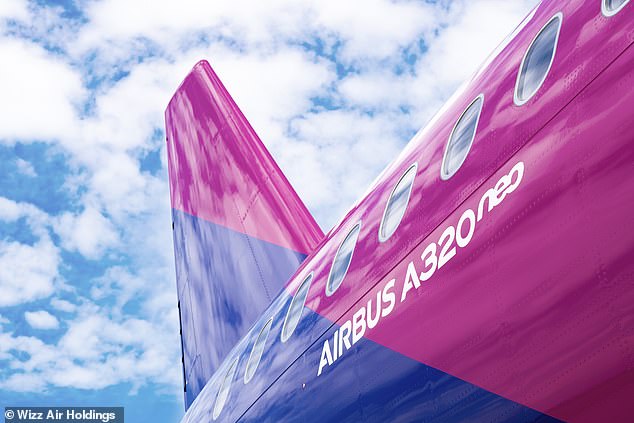- Wizz Air carried 4.96m passengers last month despite cost-of-living pressures
- The Hungarian air carrier’s total seat capacity climbed by around 1.1m to 6.04m
- Under CEO Joszef Varadi, Wizz Air plans fly 170m customers annually by 2030
Wizz Air flew almost 5 million people in December as the low-cost airline benefited from its ambitious expansion plans.
The Hungarian air carrier carried 4.96 million passengers last month, compared to 4.18 million in December 2022, despite widespread cost-of-living pressures affecting Europe and conflict in the Middle East.
While the group’s load factor – the share of available seats occupied by customers – dipped by 2.4 percentage points to 82.1 per cent, its total seat capacity climbed by around 1.1 million to 6.04 million.

Flying high: Wizz Air carried 4.96 million passengers last month, compared to 4.18 million in December 2022, despite widespread cost-of-living pressures affecting Europe
It continued to launch more routes or add extra aircraft to its existing bases during 2023, particularly across the Middle East and Eastern Europe.
Wizz Air received its 100 millionth passenger in Poland last month after adding a 12th airplane to its Warsaw Chopin Airport base during the summer.
Meanwhile, Wizz Air-Abu Dhabi, a joint venture with UAE-based holding company ADQ, achieved a record year after doubling the volume of flights to 15,000 and carrying over 3 million people.
For the whole of 2023, Wizz Air’s passenger numbers rose by nearly a third to 60.3 million, while its load factor increased by 4.1 percentage points to 90.8 per cent.
Ruth Griffin, leisure partner at Gowling WLG, said: ‘Shareholders will be assured with the business’ position as the cost of living crisis continues and encourages passengers to look for affordable travel options and the opening of new global routes furthers the airline’s scope and reach.’
At the height of the Covid-19 pandemic, Wizz Air bought up cheap landing slots with the hope of grabbing a higher share of the aviation market once travel restrictions began loosening.
Under chief executive and founder Joszef Varadi, the London-listed airline plans to have over 500 aircraft in its fleet and fly 170 million customers annually by 2030.
Varadi stands to receive a £100million bonus if the firm’s share price reaches £120 sometime before 2028 – which would give it a market value of £12billion.
Wizz Air shares were 4.3 per cent lower at £21.21 on Wednesday afternoon and have slumped by around 26 per cent in the past six months.
Fellow budget airline Ryanair also revealed on Wednesday that it flew 12.5 million passengers in December, 9 per cent up on last year, despite cancelling hundreds of flights to the Middle East due to the Israel-Hamas war.
The Irish carrier warned that short-term revenues would be impacted by numerous travel websites, including Kiwi, Kayak, and Booking.com, no longer selling its flights.
Ryanair suggested their removal might be related to a recent Irish High Court ruling prohibiting software tool Flightbox from ‘screen-scraping’ its website for online travel agents.



